Text
my Mandarin teacher has been giving us tongue twisters recently to help our pronunciation so I thought I'd share them:
first the classic:
四是四,十是十,
十四是十四,
四十是四十,
他们不是四十四
(sì shì sì , shí shì shí,
shí sì shì shí sì,
sì shí shì sì shí,
tā men bùshì sì shí sì)
four is four, ten is ten,
fourteen is fourteen,
forty is forty,
they are not forty-four
and then these two specifically focused on nasal finals:
青青山上一根藤,
青藤底下挂铜铃,
风吹藤动铜铃动,
风停藤停铜铃停
(qīngqīng shān shàng yì gēn téng,
qīng téng dǐ xià guà tóng líng,
fēng chuī téng dòng tóng líng dòng,
fēng tíng téng tíng tóng líng tíng)
On a green mountain there is a vine,
Under the green vine hang copper bells.
The wind blows, the vine moves, the copper bells move.
The wind stops, the vine stops, the copper bells stop.
扁担长,板凳宽,
扁担要绑在板凳上,
板凳不让扁担绑在板凳上,
扁担偏要绑在板凳上。
(biǎn dan cháng, bǎn dèng kuān,
biǎn dan yào bǎng zài bǎn dèng shàng,
bǎn dèng bú ràng biǎn dan bǎng zài bǎn dèng shàng,
biǎn dan piān yào bǎng zài bǎn dèng shàng)
The bamboo pole is long, and the wooden bench is wide,
The bamboo pole wants to be tied to the wooden bench,
The wooden bench doesn't let the bamboo pole be tied to it,
But the bamboo pole insists on being tied to the wooden bench
#mandarin chinese#i've mastered si shi si after coming back from taiwan with a bit of a taiwanqiang that my teacher didn't care for#but that last one is tough!
335 notes
·
View notes
Text

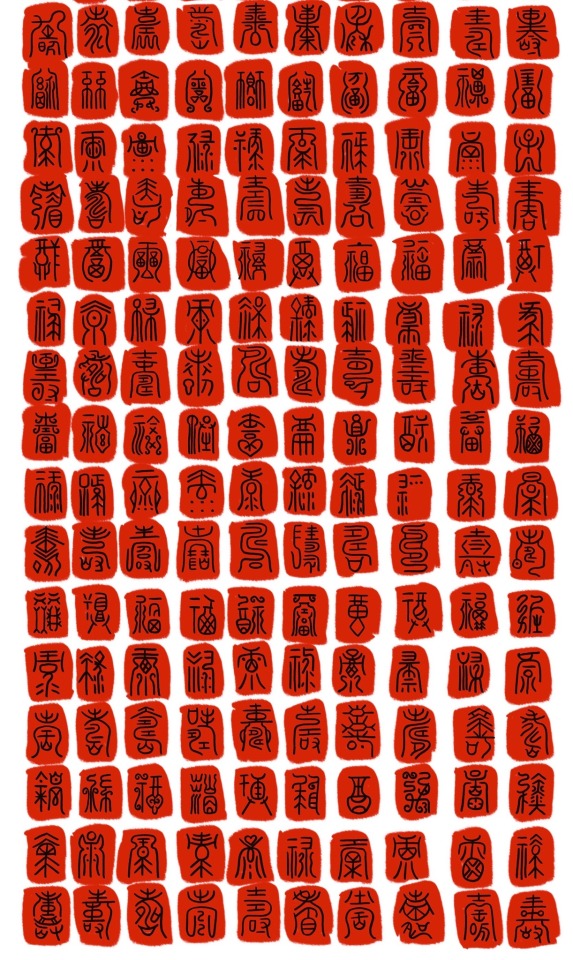
I wrote 300 glyphs for 300 blessings only to not use it in my artwork but I spent so long on these that if I don’t post them somewhere I will die
福禄寿
2K notes
·
View notes
Text
Reading Chinese Ebooks on 讀墨 ReadMoo
For the past few years, I've labored under the assumption that I can't read Chinese ebooks because I just can't focus on them. However, I recently saw someone on insta mention the app 讀墨. I was intrigued, and decided to give it a try. And wow, what a shock, I can in fact read Chinese ebooks! I just have to change it to vertical text and make the font very large.
So the past couple weeks I've been trying to read more consistently using 讀墨. The book I started with was slow going at first, which almost made me give up; it was the Chinese translation of The Last Cuentista by Donna Barba Higuera. This book really wasn't for me, and I didn't want to keep reading it. So instead of just giving up, I bought one more book and tried again: 《你的孩子不是你的孩子》 by 吳曉樂 (yes, it is the basis for the Netflix show of the same name).
I devoured the book in under a week. So yeah, I think Chinese ebooks work for me if I like the book.
Below is gonna be an overview of the app, and my thoughts on it so far. It's not comprehensive though, since there's a lot of things on this app I haven't explored yet (like the audiobooks).
***Please note that 讀墨 is a Taiwanese app, and as such it mainly offers books written in traditional characters. There are apparently books written in simplified available, but I haven't explored those since I'm fine reading traditional.***
Buying Books
Buying books is fairly simple. You make an in-app purchase of coins, which you then use to buy books. Note: As of writing this, I have recently recently received a notification from the app that their book purchasing system will be changing soon. Instead of being able to buy the books in the app, you'll have to log in to your account in a browser and buy the books there. The books will apparently then appear on the app for you to read.
As it stands, 210 coins costs $10.99, and the books I've bought have ranged in price from 210 to about 300 coins. That means the books cost ~$11-$16, just like a regular book. This could be pricey, but since I'd otherwise be paying for international shipping if I were buying a physical copy, this feels like a bargain to me. (For me, shipping books from Taiwan/China to the US typically doubles the price of the purchase rip)

Once you buy the book, it's in your library for you to start whenever you please.
As for browsing for books, I haven't gone too in-depth yet. I went in to 讀墨 with a TBR and went for books off that list exclusively. When it comes to buying books online, I almost always go on whatever site I'm buying from with a list of the books I'm thinking of buying. I get recommendations elsewhere (e.g., Goodreads or insta).
Reading Books
The 讀墨 reading interface is pretty typical for an e-reader app. What makes me like it way better than other apps I've used is that it has a lot more customization options.
For starters, you've got 6 options for page/text color. There's the typical black, white, and sepia, but there's also blue and green! I use the 奶綠 option, since I don't like having such a stark contrast between the text and the background when reading on my phone for long periods.
Then there's the options for changing the text size and spacing. You can make it bigger or smaller as you please, and put more or less space between each line of text.
You can also change the font. There's 8 different fonts you can choose from, including the default. There's even a font that puts 注音 next to each character! You can see a preview of that one in the photo below.
And then, there's the option to switch between horizontal and vertical text. The default is horizontal text, but I've come to prefer vertical when reading Chinese novels. If you go to your settings on your profile, you can make vertical text your default, which is what I ended up doing.

Like any good e-reader, there's options to highlight text. There's four different colors you can use (pink, yellow, purple, and blue). If you go the ToC, you can find all of your highlights and filter by color of highlight. Super convenient, since I've been using pink to highlight words/phrases I don't know or find interesting and yellow to highlight key sentences/paragraphs.

Aside from highlighting, when you select text you have the option to look the characters up in a dictionary or online. I've been getting a lot of errors with this recently, but I'm wondering if that's just my phone acting weird? It worked perfectly fine when I first started using the app. Anyways, the dictionary it takes you to is 夢典 MoeDict and it opens in a browser. This personally is a bit annoying bc I actually have this dictionary app installed on my phone, but this is a minor complaint. The dictionary opening in a new browser tab is a non-issue.
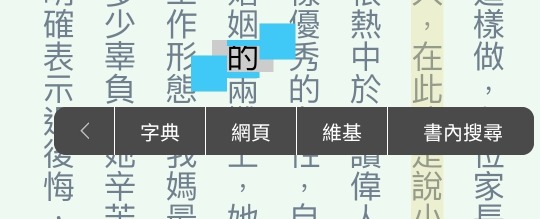
Reading Stats
Now, I'm a big dork and love to track my reading stats. To my great satisfaction, 讀墨 keeps track of some stats. The main one is time spent reading. You can set a daily goal (the minimum is 20 minutes), and if you reach it you get a nice checkmark on the calendar. The calendar doesn't update until the very end of each day, so if you've reached your goal for the day it won't show on the calendar until the next day.
Also, keep in mind time differences between where you live and Taiwan. I'm ~12 hours behind Taiwan, so the app doesn't start a new day until around noon for me.
Below the calendar, there's a chart that shows your total reading times for a week, month, or year. I normally can't be bothered to time my reading (especially not when I'm reading physical books) so this is cool to see. I think when it comes to reading in Chinese, being timed is more interesting because I'm able to more clearly gauge progress.


And below all that, there's a breakdown of the genres you read. I don't pay much attention to genre when choosing books, so I don't find this one quite as interesting.

(tfw you're reading a non-fiction book about a tutor so your main genre becomes 教育)
Overall Thoughts
So yeah, I've enjoyed myself so far. Aside from the reading interface, I find the app pretty easy to navigate. I spent a bit of time just clicking around and was able to figure out what's what pretty quick.
Like I said, this isn't a comprehensive review, but I'd recommend giving the app a try if you're willing/able to put down money for ebooks and are able to read traditional. It feels worth the money for me, since the interface is pretty customizable and easy to use.
If you're wondering where to find simplified ebooks, idk. This is my first real foray into Chinese ebooks, so I don't really know where to find them for simplified or traditional. I have heard that it is a little easier to pirate Chinese ebooks since their copyright laws are a little different than ours in the US?
#books#this is very cool! i don't love reading chinese on my phone but yes getting physical books can be sooo expensive
57 notes
·
View notes
Text
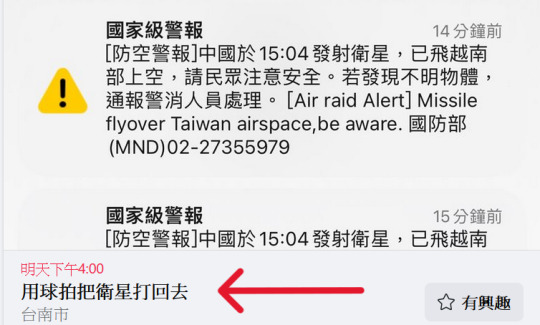
My favourite response to the 衛星 wèixīng / satellite and incorrect missile warning incident
(which happened on Jan 9 but I rediscovered this screenshot I took of a "用球拍把衛星打回去" event someone created)
球拍 qiúpāi / racket
#taiwanese people are so funny#there was another viral facebook event recently called something like 去海邊接蔡英文#after the DPP put out a campaign ad in which lai ching-te dropped cai ying-wen off at the beach and picked up his vice president#symbolizing the passing of the torch from cai to lai#and it was quite heartwarming but also did kinda look like he was leaving cai in the middle of nowhere#mandarin chinese
17 notes
·
View notes
Text
Langblr Asks
What’s your native language?
How many languages do you speak?
What language(s) are you currently studying?
How many/which languages would you like to know in the future?
Do your friends speak other languages?
What’s the most difficult word for you to say in your native & target languages?
How do you call your favorite animal in your target languages?
Write your favorite color in all the languages you know it in.
How long have you studied your target language(s)?
What’s your favorite word in your target language(s)? Least favorite?
What’s the funniest word in your target language(s)?
What’s the prettiest word in your target language(s)? Ugliest?
One thing you dislike about your target and/or native language?
Do you have any international friends?
Why are you learning your target language(s)?
Do you ever want to live somewhere where you’d speak your target language(s)?
What was/is the first language you want/ed to learn?
Have you ever made a friend speaking your target language(s)?
Do you listen to music in your target language(s)? If so, who are your favorite artists?
Opinion on duolingo?
What’s your favorite method of studying?
Have you ever played pokemon in your target language(s)?
Favorite blog in your target language(s)?
Do you ever speak to yourself in your target language(s)?
Ever speak to your pets in your target language(s)?
Do you ever feel like your target language(s) is(are) under appreciated? Why/why not?
How do people usually react when you mention that you’re studying your target language(s)? Do their reactions annoy you? Make you happy?
How do natives react when they hear that you’re studying their language?
Do you have any advice for someone who’s never studied a language before?
Where are you from? What are popular/”useful” foreign languages in your area?
Are there dialects in your country? Do you speak one?
Have you ever tried to learn a dialect for your target language(s)?
Do you ever want to have a career in languages?
How has learning languages impacted your life?
Do you have any big travel plans for the future?
What’s your least favorite language? Why? Favorite?
Do you know any obscure/useless words in your target language(s)?
Was there ever a word you pronounced incorrectly until someone corrected you?
What’s the most embarrassing thing that’s ever happened to you while studying your target language(s)?
Have you ever eavesdropped on people speaking your target language(s) in public?
Have you ever had a negative experience with a native?
What’s the most positive experience you’ve had with a native?
Tell me about your best friend in your target language(s)
Have you ever put sticky notes all over your house before?
Do you ever think in your target language(s)?
Are there any cognates between your native and target language(s)?
Have you ever met a stranger in public with whom you spoke your target language(s)?
Have you ever had an “I understand it now!” moment with your target language(s)?
Do you have any language pet peeves?
Is there a language that you’ve tried to learn but could never stick with it or just weren’t interested?
4K notes
·
View notes
Text
This is a really complicated topic! I'm not a native speaker, though for what it's worth I would use the same productions for the above phrases.
In most analyses of 3rd tone changes, whether or not the third tone changes is going to be related to the structure of the phrase/sentence and also potentially by stress. According to Duanmu San's analysis, tone 3 sandhi happens in "metrical feet", which basically means groups of two syllables in which one of them is stressed (same concept as iambs/feet in poetry). So each 3-3 foot turns into 2-3. Syllables that are syntactically close to each other will also show tone sandhi.
So in the sentence 我很好, 很好 would be considered a foot and become 2-3 because of the way they are stressed. Those two syllables are closer to each other than 我 and 很 because 我 is the subject of the sentence and 很好 is the predicate, so 我 stays as 3. 我也很好 breaks down very neatly into two feet, 我也-很好, so the tones become 2-3-2-3.
This is a very basic summary of the rules as written in Duanmu San's book The Phonology of Standard Chinese (vol. 2), which I think is quite clearly written if you have a bit of background in linguistics. I'm not an expert on tones or syntax or anything so I can't totally say whether his theory always works but it applies for these examples.
Honestly I don't recommend actually trying to memorize these types of rules beyond the basic disyllabic pattern though (stuff gets a LOT more complicated when you bring syntax into the picture, and not everyone agrees on how the rules actually work!). Instead just try to get a lot of speaking and listening practice and eventually you'll be able to say these types of phrases pretty confidently without thinking about the correct tone patterns. This is the type of situation where shadowing could be pretty helpful.
Languageblr, studyblr, mandarinblr, please help!
So I've heard that when a third tone comes before another third tone you change the first into a rising tone - but what if you have three third tones in a row?
What if I were to say 我很好, is it 3 2 3? Or 2 3 3?
And what if I had four or more in a row, like 我也很好 - does that go 2 3 2 3?
I've googled, but I can't find anything other than rising before the first third, so any help would be appreciated 🙏
#zbtg posts#hope this was interesting/helpful and not a totally excessive amount of information!#i am procrastinating cleaning my bathroom and also love talking about chinese linguistics
50 notes
·
View notes
Text
#largely no because i like reading things in their original language when i can and english translation when i can't#but i have read a japanese novel that hadn't been translated to english in chinese before#and would definitely do it again#(absolutely nothing wrong with reading books translated from your native language to your tl though! it just isn't for me)
242 notes
·
View notes
Text
it’s interesting to me when people on tumblr who are learning chinese say you don’t need to learn radicals, because………i just don’t think that’s true? as someone who grew up speaking and learning it natively i may be biased, but there’s just…….so many situations when knowing at least basic radicals and meanings is very useful.
if you’re in an area that uses traditional or simplified and you’re used to the opposite set, then knowing radicals can be key to understanding the written language on signs in the area, menus, letters, etc. if you’re reading something and you know the meaning of the characters around a new character, but you don’t know what that character is because it’s unfamiliar to you, knowing radicals allows you to make a guess at the meaning of the character and possibly connect it to the spoken version of the character that you already know based on that context, as for example a radical often lends pronunciation clues to a character.
also, knowing radicals makes it much easier to remember how to write characters—it’s much easier to remember, say, 想 as wood-and-eye-over-heart (木目心) or 绿 as silk-record (silk radical 纟plus the word 录 as in 录音, audio recording) because those are patterns you already have than to remember the individual strokes necessary to write a character. and on the topic of writing—knowing radicals also tells you the order in which to write a character, which is absolutely key to writing legible, orderly characters in a minimal amount of time!
obviously the measure of how many radicals you “really” “have to” know is going to vary by the person you talk to, but i think it’s important to have at least a passable basis in radicals if you’re going to learn chinese, a language written with radicals as important components of words.
and, lest i be remiss—here’s some resources i managed to find with a quick search.
hackingchinese page on radicals with a number of links to .anki, .txt, and .pdf files of the 100 most common radicals
hskacademy list of 214 radicals
a fluentu page that includes 214 radicals and expounds upon the meaning of phonetic and semantic components and their difference from radicals
ltl-beijing page that includes links to a list of radicals, some history behind them, a quiz, printable pdf, and more
and finally, not a link, but a recommendation for an app: download TOFU learn and use the hsk level decks! this is a very easy way to get into the habit of writing and repeating characters daily, which is absolutely vital if you want to get anywhere with reading and writing. dot languages also has a written component to practices, but the app is multi-functional and not confined to writing, nor does it give information about component and radical meanings like TOFU learn does. additionally, i would recommend downloading pleco, which is a very thorough dictionary that has the option to view the radical/component breakdown of a given character (under the “chars” tab—for example it breaks down 音 as 立 and 日) i’ve also seen skritter recommended a lot, but i cannot vouch for that.
#another reason to do this is because at a certain point being able to describe a character with words is a really good skill!#and one of the ways to do that is by describing the radical#such as saying X字旁Y (so 張 would be 弓字旁張)#(there are other structures as well it kinda depends on the radical lol)#and this may be a linguistics grad school thing but searching dictionaries by radical#i'm still really bad at it but i'm getting better lol
197 notes
·
View notes
Text
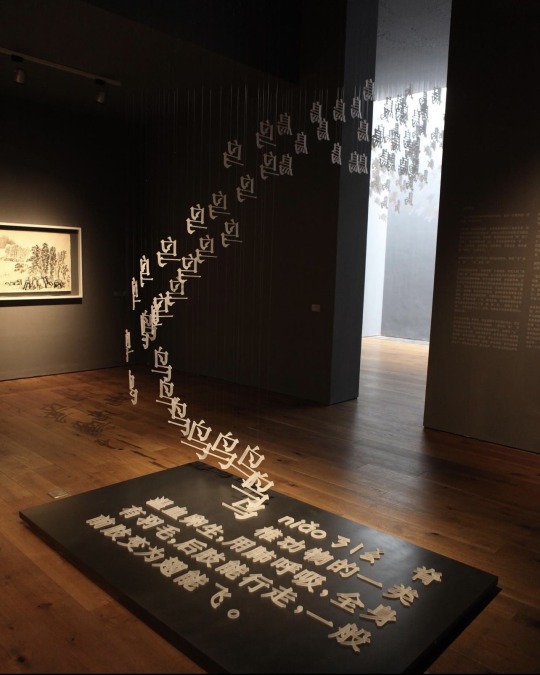
Xu Bing: The Living Word (2018)
1K notes
·
View notes
Text
rocks, minerals, and other stuff in mandarin

(i apologize for the title i am not a creative person)
岩石 yánshí rocks
火成岩 huǒchéngyán igneous
花岗岩 huāgāngyán granite
黑曜岩 hēiyàoyán obsidian
玄武岩 xuánwǔyán basalt
浮石 fúshí pumice
沉积岩 chēnjīyán sedimentary
砂岩 shāyán sandstone
石灰岩 shíhuīyán limestone
白垩 bái'è chalk
燧石 suìshí flint
砾岩 lìyán conglomerate
煤 méi coal
变质岩 biànzhìyán metamorphic
板岩 bǎnyán slate
页岩 yèyán schist
片麻岩 piànmáyán gneiss
大理石 dàlǐshí marble
矿物 kuàngwù minerals
石英 shíyīng quartz
云母 yúnmǔ mica
硫磺 liúhuáng sulphur
赤铁矿 chìtiěkuàng hematite
方解石 fāngjiěshí calcite
孔雀石 kǒngquèshí malachite
绿松石 lǚsōngshí turquoise
高玛瑙 gāomǎnǎo onyx
玛瑙 mǎnǎo agate
石墨 shímò graphite
宝石 bǎoshí gems
红宝石 hóngbǎoshí ruby
紫水晶 zǐshuǐjíng amethyst
黑玉 hēiyù jet
蛋白石 dànbáishí opal
月长石 yuèzhǎngshí moonstone
石榴石 shíliúshí garnet
黄玉 huángyù topaz
电气石 diànqìshí tourmaline
蓝宝石 lánbǎoshí sapphire
绿宝石 lǚbǎoshí emerald
玉石 yùshí jade
海蓝宝石 hǎilánbǎoshí aquamarine
钻石 zuànshí diamond
金属 jīnshǔ metals
金 jīn gold
银 yín silver
铂 bó platinum
镍 niè nickel
铁 tiě iron
铜 tóng copper
锡 xī tin
铝 lǚ aluminium
汞 gǒng mercury
锌 xīn zinc
478 notes
·
View notes
Text
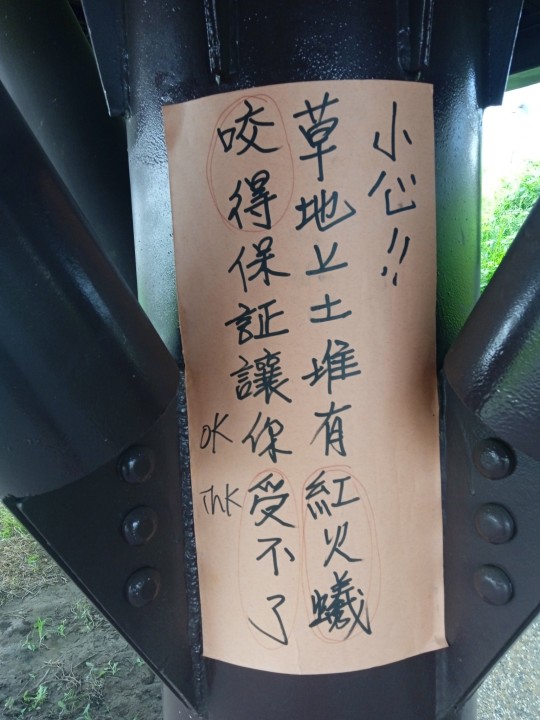
「小心!!草地上土堆有紅火蟻
咬得保証讓你受不了」
「Ok Thk」
"Be careful! The mounds on the grass have red fire ants. I guarantee you won't be able to endure their biting"
"Ok Thk"
39 notes
·
View notes
Text
Random list of a few of my favorite Chinese words so far:
电灯泡 - literally "light bulb," figuratively, an unwanted third wheel
放鸽子 - literally "to place/put a pigeon," figuratively, to stand someone up/no show
死定 - screwed (as in doomed, not as in fucked)
圣诞老人 - Old Man Christmas, Santa Claus
鹅毛大雪 - goose-feather snow, a heavy snow of fluffy flakes
Every single time a word is made "the same but more" by doubling it, or doubling characters in general for emphasis (高高兴兴,长长久久, 安安轻轻,大大小小, 酸酸甜甜,干巴巴,to name a few)
半边天 - literally "half the sky," figuratively womankind
The vast versatility of 蛋 as a way to insult people (坏蛋,笨蛋, 混蛋)
赖床 - laze about in bed
惊喜 - pleasantly surprised
大丈夫 - literally big husband, figuratively a manly man
厉害 - cool, awesome, incredible
干嘛 - why on earth...?
大姨妈 - literally great aunt, figuratively shark week/that time of the month/menstruation
想得美 - in your dreams!
My personal constant ability to confuse 妇女 and 妓女. (Woman and prostitute)
Likewise, my personal constant ability to confuse 瓜子 and 傻瓜. (Melon seeds and fool)
轮椅 - wheelchair
And, of course
饭圈 - fandom!
244 notes
·
View notes
Text
新寶島生詞-第三章:關塔那摩的麥當勞
This chapter follows 薩拉希, a former prisoner at Guantanamo Bay (interestingly and very unusually, the pinyin for Guantanamo is exactly the same as how it is spelled in English). 薩拉希 seems to be referencing, if not directly representing, Mohamedou Ould Slahi, the author of Guantanamo Diary, which is... kind of a weird choice ngl. But anyway, in this chapter, which takes place in 2026, Guantanamo Bay has been closed for a few years and 薩拉希 returns for a reconciliation meeting along with other former prisoners and guards.
沙鈴 (shālíng): maracas
基地 (jīdì): base (military)
走馬看花 (zǒumǎkànhuā): gain a superficial understanding from perfunctory observation
拘留 (jūliú): to detain, keep in custody
獲釋 (huòshì): to be released (from prison)
囚犯 (qiúfàn): prisoner, convict
隨身聽 (suíshēntīng): walkman
奴隸 (núlì): slave
妄想 (wàngxiǎng): vain hope, wishful thinking
驗證 (yànzhèng): to verify, prove
怪異 (guàiyì): strange phenomenon; monstrous, strange
圍牆 (wéiqiáng): enclosing/perimeter wall
禁運 (jìnyùn): embargo
鷹架 (yīngjià): scaffolding
執勤 (zhíqín): to be on duty
腹肌 (fùjī): abs
就學貸款 (jiùxuédàikuàn): student loans
感嘆 (gǎntàn): to sigh with feeling, lament
撲鼻 (púbí): (of a smell) to assail the nostrils
娓娓 (wéiwéi): (talk) tirelessly
久別重逢 (jiǔbiéchóngféng): to meet again after long separation
編號 (biānhào): serial number, to number
圍籬 (wéilí): fence
關口 (guānkǒu): pass, gateway
船塢 (chuánwù): dock, shipyard
接駁車 (jiēbóchē): shuttle bus
軍艦 (jūnjiàn): warship, naval vessel
零卡 (língkǎ): zero-calorie
囚房 (qiúfáng): prison cell
司令部 (sīlìngbù): headquarters, military command center
3 notes
·
View notes
Text
新寶島生詞-第二章:過度開發的回憶
While the first chapter of 新寶島 was from the perspective of the Cuban artist 杜維耶/Duvier, the second chapter follows a new protagonist, 元元/Yuanyuan, a Taiwanese former child actor. One thing that's challenging about this book is how the individual chapters go back and forth in time. This chapter opens with 元元 saying goodbye to her parents as they return home to Taiwan, as she has decided to stay in Cuba to finish the filming of the a movie, her first acting experience since the single movie she acted in as a child. It then bounces back to her experience of waking up in Havana, moving seamlessly back and forth through flashbacks within flashbacks.
望遠鏡 (wàngyuánjìng): telescope
柏油 (bǎiyóu): asphalt, tar
巡視 (xúnshì): to make an inspection tour, look around
汙漬 (wūzé): stain
天井 (tiānjǐng): courtyard, atrium, skylight
海堤 (hǎidī): seawall, embankment
避開 (bìkāi): to avoid
補助 (bǔzhù): subsidy, allowance
獨眼龍 (dúyǎnlóng): one-eyed person, person blind in one eye
影音 (yǐngyīn): recorded media
飾演 (shìyǎn): to play the role of
氾濫 (fànlàn): flooding, overflowing
幕僚 (mùliáo): aide, staff
陳年 (chénnián): longstanding, preserved for a long time
一連串 (yìliánchuàn): a succession, series, string of
國務卿 (guówùqīng): secretary of state (USA)
廠房 (chǎngfáng): factory building
分歧 (fēnqí): difference, divergence
瞌睡 (kēshuì): to feel sleepy, 打瞌睡 (dǎ kēshuì): to doze off
虛擬 (xūnǐ): to make up, fabricate
活屍 (huóshī): zombie
四下無人 (sìxiàwúrén): nobody is around
搔癢 (sāoyǎng): to scratch an itch, tickle
腳本 (jiǎoběn): script
滑軌 (huáguǐ): slide, rail, runner (such as from a drawer)
募資 (mùzī): to raise funds
人馬 (rénmǎ): forces, troops; personell
搞砸 (gǎozá): to mess up
嬉鬧 (xīnào): to laugh and frolic, play
釣竿 (diàogān): fishing pole
輔導金 (fǔdǎojīn): grant
瑪黛茶 (mǎdàichá): mate (beverage)
窺 (kuī): to peep, spy
6 notes
·
View notes
Text
新寶島生詞-- 第一章:閃回
大家好!It's been a while since I really posted on this blog, but I just finished reading 台北人/Taipei People after a very long time and am starting a new book. 新寶島/The Formosa Exchange is a novel by 黃崇凱 Huang Chong-Kai that won the 2021 Taiwan Literature Award and the 2021 Openbook Award. The premise of the book is that one day, for no conceivable reason, the residents of Taiwan and Cuba spontaneously switch places. The rest of the story follows multiple Taiwanese and Cuban protagonists as they adjust to their new realities. I know I won't keep up with my flashcards once the semester starts, so I'll be posting my vocab here instead!
受邀 (shòuyāo): to accept an invitation
駐村 (zhùcūn): artist's residence; to do an artist's residence
緯度 (wěidú): latitude
毬果 (qiúguǒ): pine-cone
尼龍 (nílóng): nylon
手電筒 (shǒudiàntǒng): flashlight
夢境 (mèngjìng): dreamland, dream
懸浮 (xuánfú): to float; suspension
避難所 (bìnànsuǒ): refuge, sanctuary, haven, shelter
頹圮 (tuípǐ): to collapse; dilapidated
迷宮 (mígōng): maze, labyrinth
篩選 (shāixuǎn): to select, screen, filter
籌備 (chóubèi): to prepare, arrange
天線 (tiānxiàn): antenna, aerial
投手 (tóushǒu): pitcher (baseball, etc.)
打趣 (dǎqù): to banter, tease, make fun of
虛構 (xūgòu): to fabricate, make up
交媾 (jiāogòu): to have sex (literary)
楓樹 (fēngshù): maple tree
陸續 (lùxù): one after the other, in succession
外快 (wàikuài): extra income
吞噬 (tūnshì): to swallow, gobble up, engulf
藝廊 (yìláng): art gallery
匱乏 (kuìfá): to be short of, deficient
#chinese#mandarin chinese#langblr#studyblr#vocab#xbd vocab#zbtg posts#ooh i haven't posted in so long... time to go update my pinned
3 notes
·
View notes

